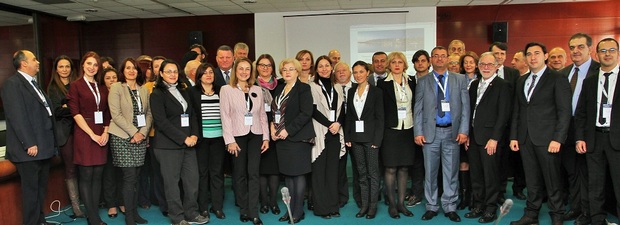East European nations, Greece and Tunisia tackle HCFC phase-out

Nine national refrigeration associations met with a UN body in Belgrade, Serbia recently to tackle the HCFC phase out and hear about how to leapfrog HFCs by using natural refrigerants.
Opportunities to leapfrog from HCFCs to climate-friendly natural refrigerant-based solutions were presented by UN and industry figures to national refrigeration associations at a meeting to discuss HCFC phase-out management plans (HPMPs) in Belgrade, Serbia (29 Nov.-1 Dec. 2016).
Heads of national refrigeration associations and Montreal Protocol focal points from Eastern European countries, Greece and Tunisia attended the meeting on the latest HPMPs as part of the work programme of UNEP’s Regional Ozone Network for Europe & Central Asia (ECA network), which is funded by the Multilateral Fund for the Implementation of the Montreal Protocol.
The meeting was focused on HCFC phase-out strategies and surveys from the participating countries (see ‘Background’ below for full list) on what alternatives they have started to use, and whether there is a possibility to leapfrog to natural refrigerants.
Natural refrigerants – interest high!
Government, association and UN representatives made presentations on day one of the HPMP meeting on the market use of natural refrigerants, training and case studies – in Eastern Europe and elsewhere.
Gratiela Tarlea, president of the Romanian General Association of Refrigeration (AGFR), spoke about current use of natural refrigerants in Romania, while other presentations dealt with technical capacity building and training on ammonia, CO2 and hydrocarbons.
Gert Nielsen, lead engineer in refrigeration at Norwegian company GK Kulde AS and Alexander Cohr Pachai from Johnson Controls chaired a discussion on ammonia training. Marino Grozdek, assistant professor at the University of Zagreb, Croatia, gave participants an overview on training in hydrocarbons and CO2.
The second day was also taken up with natural refrigerants, this time focusing on ammonia and water. Leading ammonia expert Pega Hrnjak (a professor at the University of Illinois) and Johnson Controls’ Pachai presented papers on ammonia industrial refrigeration trends and the use of water as a refrigerant respectively.
The third day of the meeting was focused on similar themes, including HFC phase-down policies, legislative options in Serbia, and the influence of the EU’s F-Gas Regulation.
Towards ozone-friendly solutions
The meeting also focused on conducting surveys on ozone-friendly alternatives in HPMP participating countries. Results from such surveys could provide a better understanding of the current use and consumption trends of HFCs, HFOs and natural refrigerants by sector and by substance.
For the first time, the HPMP agenda included a session on gender considerations in project implementation. There has been for a long time a discussion on how to apply gender analysis and statistics to projects addressing global environmental problems such as ozone layer depletion and global warming could be included.
Background
Participants included Montreal Protocol focal points and refrigeration experts from Albania, Bosnia and Herzegovina, Croatia, Macedonia FYR, Montenegro, Romania, Serbia and Turkey, guest experts from Greece and Tunisia, ASHRAE, the International Institute of Refrigeration, Eurammon, Johnson Controls, Macedonia FYR and Norway, as well as representatives of the implementing agencies UNDP and UNIDO.
